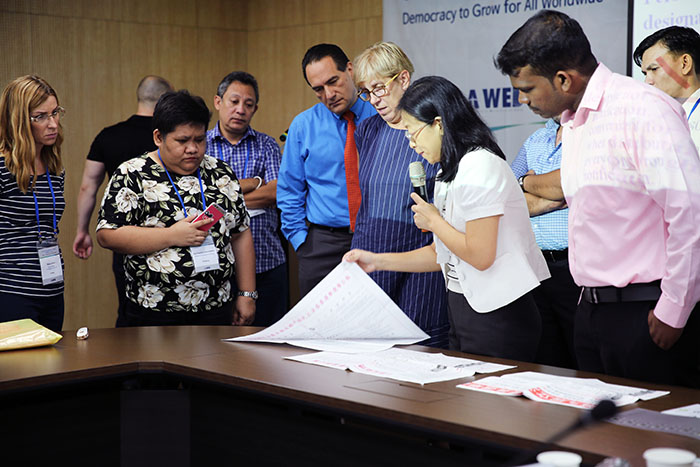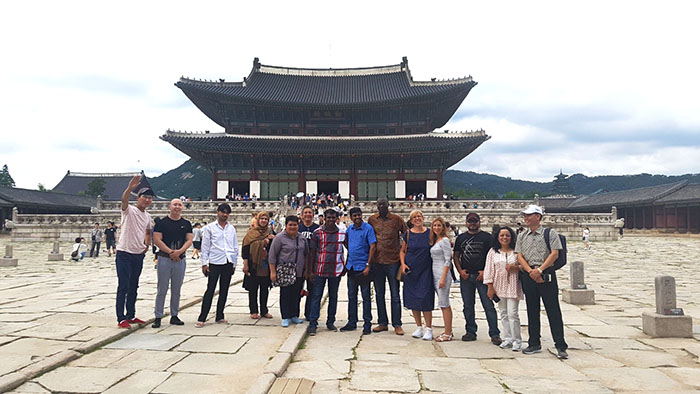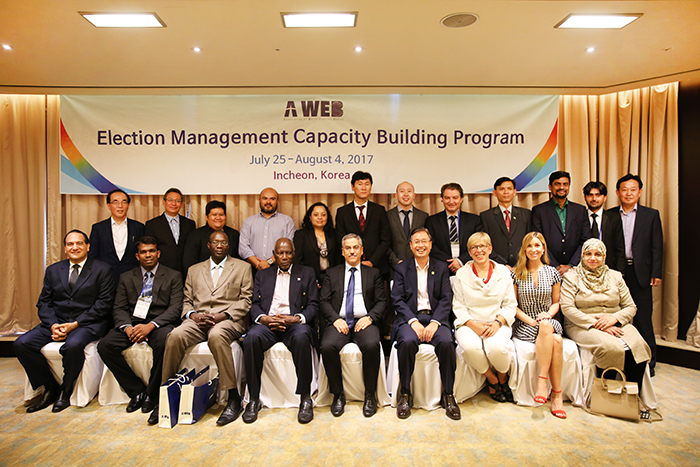| Election Management Capacity Building Program-Helping Voters make informed choices |
|---|
| Last updated 2017-08-18 |
|
This year’s third Capacity Building program took place in the heat of summer from July 25th to August 4th in Incheon, Korea, the location of the A-WEB Secretariat. 16 participants from 8 countries came together to exchange knowledge on and strategies of voter education. While some of the EMBs present had sent participants to previous Capacity Building Programs, the Independent Electoral Commission of the Gambia as well as the Central Election Commission of the Republic of Kazakhstan participated for the first time.
(Group Picture with A-WEB Secretary General Yong-Hi Kim)
As is tradition with A-WEB training programs participants presented their organizations’ strategies and best practices on voter education on the first day. It quickly became clear that while there was a consensus that voter education is important, not all EMBs agreed on the extent to which an EMB should be involved in such education programs. Delegates from the State Electoral Commission of Croatia argued that EMBs should provide information on the technical aspects of voting, but drew the line there. Other EMBs, for example the Election Commission of Sri Lanka, showcased a variety of voter education approaches that went far beyond the technicalities of voting. This schism was to characterize the days to come.
(Janja Horvat Drobnjak from the State Electoral Commission of Croatia reporting on voter education)
On Thursday, the 3rd day of the program, Ms. Mei-Ling Hsieh from the Central Election Commission of Taiwan visited the training site to present voter education strategies the CEC of Taiwan uses to entice voters to go to the polls. She brought a wealth of material from the CEC to supplement her presentation and participants were impressed with the attention to detail the CEC pours into its voter education programs.
Friday was a very exciting day for participants and organizers. Since Brexit and the election campaign that ended in Donald Trump becoming the 45th US President, the concept of fake news and the power of social media have been on everyone’s lips. A-WEB therefore decided to offer a whole seminar dealing with the influence of new media on elections and especially voters. Prof. Daniel Connolly from Korea University held a riveting seminar that was comprehensible for everyone. Under the title ‘From Fake News to Emotional AI: Emerging Threat’s to Tomorrow’s Elections’ issues such as bots, hacking and the democratization of propaganda were discussed. It certainly was an eye-opening experience for EMBs and organizers alike.
(Prof. Daniel Connolly on fake news and AI)
In the afternoon, Mr. Luke Butcher from the National Election Commission (NEC) spoke on voter turnout and civic education in Great Britain. With an increase in the frequency of elections in the country election fatigue would be an obvious consequence. However, in the British case, voter fatigue has yet to happen. In fact, quite surprisingly, turnout has increased with each of the many elections in the past few years. Especially the mobilization of the younger generation in the recent parliamentary elections held many lessons for the participants.
(Mr. Luke Butcher discussing British elections)
On the weekend participants were invited to a Culture Tour of the main sights of Seoul and also had the chance to experience Korean culture.
(Participants visiting Gyongbok Palace)
(Participants wearing the traditional Korea Hanbok)
Monday continued with a case study on voter and civic education in Korea, focusing on the information that is provided by the National Election Commission to voters immediately before an election.
(Seungryeol Kim on informing voters in Korea)
As part of an MOU that A-WEB signed with Arab EMBs at the beginning of the year, this Capacity Building Program saw two representatives of Arab EMBs discuss voter education and electoral participation in the Arab world. Mr. Mohamed Chafik Sarsar, former Chairperson of the Independent High Authority of Elections of Tunisia, and Mr. Maxim Sansour, consultant for many Arab EMBs including Palestine and Jordan, showcased how great voter education strategies can come from where we least expect it. Arab countries are often neglected when discussing electoral practices due to them being new democracies, democracies in transition or no democracies at all. However, it quickly became clear that a democratic culture has been blossoming in some of the countries in the region that holds lessons for all of us. A-WEB appreciates the unique perspective the two representatives offered on a subject that is often dominated by case studies from developed democracies.
(Mr. Mohamed Chafik Sarsar presenting strategies for youth participation in the Arab region)
(Mr. Maxim Sansour presenting case studies of voter education strategies across the Arab region)
On Tuesday, all participants moved to Seoul to visit the Korean Civic Education Institute for Democracy (KOCEI) as well as the NEC of Korea. Especially the visit to the former left a lasting impression on the participants. Prof. Seon-mi Joo from KOCEI gave a stimulating talk on the understanding of democratic civic education on Korea and participants had a lot of questions on the relationship between the NEC, KOCEI and Korean civil society. At the NEC the delegates met Vice-Chairperson Mr. Sang-bu Moon and were able to visit the Commissioner’s meeting room.
(Prof. Seonmi Joo from KOCEI speaking)
(Group picture with the NEC Vice-Chairperson Mr. Sang-bu Moon in front of the NEC headquarters)
The very last session of the program was held by A-WEB researcher Michael Hamasaki. He invited the participants to discuss the various aspects and issues that need to be considered by all election stakeholders when introducing new technologies in the electoral cycle. The session was very interactive and allowed the participants of the Commission on Elections of the Philippines (COMELEC) to report on their experience with the PCOS machines COMELEC is employing during the voting process.
(Farewell Luncheon)
The program closed with the Farewell Luncheon on August 3rd and participants returned to their home countries on August 4th. A-Web would like to thank all participants and speakers for their invaluable contributions to the program. We hope that it has been as inspiring for the EMBs as it has been for us. Kamsahamnida!
EMBs present: Independent Election Commission of Afghanistan (2), State Electoral Commission of Croatia (2), Independent Electoral Commission of the Gambia (2), Central Election Commission of the Republic of Kazakhstan (2), Union Election Commission of Myanmar (1), Commission on Elections of the Philippines (2), Election Commission of Sri Lanka (2), Tribunal Supremo Electoral of El Salvador (3)
|



